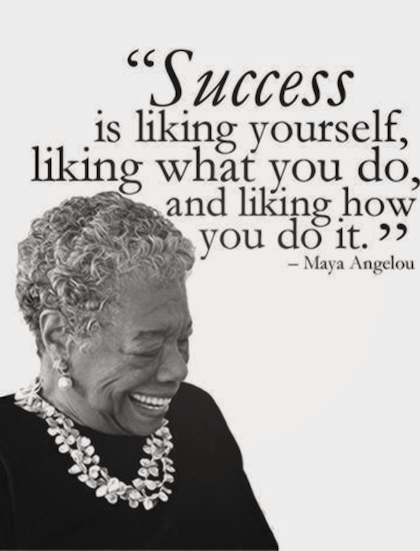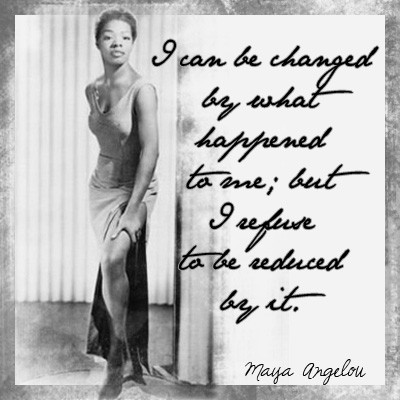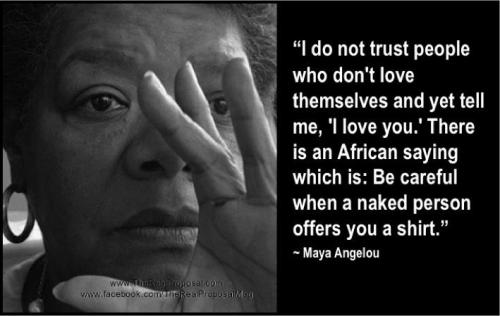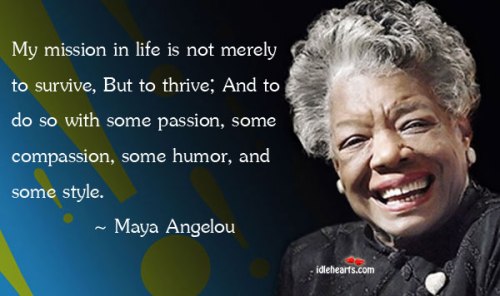Let’s Get Inspired
In todays Let’s Get Inspired section I would like to share some information on an influential person Wangari Maathai
Wangari Maathai (1940-2011) was the founder of the Green Belt Movement and the 2004 Nobel Peace Prize Laureate. She authored four books: The Green Belt Movement; Unbowed: A Memoir; The Challenge for Africa; and Replenishing the Earth. As well as having been featured in a number of books, she and the Green Belt Movement were the subject of a documentary film, Taking Root: the Vision of Wangari Maathai (Marlboro Productions, 2008).
Wangari Muta Maathai was born in Nyeri, a rural area of Kenya (Africa), in 1940. She obtained a degree in Biological Sciences from Mount St. Scholastica College in Atchison, Kansas (1964), a Master of Science degree from the University of Pittsburgh (1966), and pursued doctoral studies in Germany and the University of Nairobi, before obtaining a Ph.D. (1971) from the University of Nairobi, where she also taught veterinary anatomy. The first woman in East and Central Africa to earn a doctorate degree, Professor Maathai became chair of the Department of Veterinary Anatomy and an associate professor in 1976 and 1977 respectively. In both cases, she was the first woman to attain those positions in the region.
More About Wangari Maathai
(Source: http://www.buzzle.com/articles/famous-people-from-africa.html)
A famous environmentalist from Kenya, Wangari Maathai is the first woman from the under privileged region of East and Central Africa to have attained a doctorate. Wangari Maathai led a life full of struggle. Well-known for the “Green Belt Movement”, she has inspired many people the world over to take up the cause of afforestation.
Wangari Maathai was born on 1st April, 1940 in a Kikuyu family, an ethnic group in Kenya and came from the Ihithe village of Nyeri District. She did her schooling at St. Cecilia’s Intermediate Primary School. After completing graduation from the Loreto High school in Limuru, Maathai received a scholarship for studying at Mount St. Scholastica College in Kansas, USA. Biology was her major subject for graduation. Maathai’s brilliant academic record became the driving force in her quest to pursue higher education. She went on to pursue a Master’s degree in biology at the University of Pittsburgh.
Returning to her homeland was not a pleasant experience for Maathai. Despite her great achievements, Wangari Maathai had to face gender bias in her own country; she also found it difficult to get a job. However she didn’t lose hope and finally got employed as a research assistant at the School of Veterinary Medicine in Nairobi. In 1971, Wangari Maathai became the first woman from East Africa to attain a Doctorate in Anatomy.
Dr. Maathai was an activist by nature and worked with organizations like Red Cross Society, United Nations Environment Programme and National Council of Women of Kenya. 5th June, 1977 was a historic day in the life of Wangari Maathai as the first sapling of “Green Belt Movement” was planted. The main objective of Green Belt Movement was to preserve native plant species by creating nurseries. The nurseries were also meant to provide income to women and their families.
Wangari Maathai’s husband filed for divorce in 1979. She also lost elections for the post of chairman of the National Council of Women of Kenya. However, her personal problems and failure in elections didn’t stop her from continuing the social activities associated with Green Belt Movement. Many non-governmental organizations from European countries supported the cause of environmental conservation taken up by her. Dr. Maathai was often referred to as a crazy woman who opposed developmental activities going on in the country; however it didn’t deter her from pursuing a hard battle of saving trees. Once she was even attacked by miscreants during a tree plantation program.
Resilience was one force which helped Wangari Maathai to deal with failures in life. Finally, in 2004 Dr. Maathai was awarded the Nobel Peace Prize; she passed away on 25th September, 2011.
Read more at Buzzle: http://www.buzzle.com/articles/famous-people-from-africa.html
Here is her interview on Sustainable Styles
(Source: http://www.sustainablestyles.com/index.php?option=com_content&view=article&id=114&Itemid=516 )
Kenyan environmental and political activist Wangari Maathai passed away September 25, 2011. Wangari, who started the Greenbelt Movement, was the first African woman to win a Nobel Peace Prize. Her life was dedicated to fighting erosion, bringing jobs to women, and contributing to the greening of her country.
I was meeting Wangari for the third time. I had attended a lecture at Cooper Union, introduced by a member of the Kennedy clan, known for taking environmental preservation to heart. The second time I saw Wangari, she was being interviewed by National Geographic for its special edition on Africa. Now I was in a hotel close to the United Nations with two cameras – and ten questions.
PP: What is your wish for the future of our planet?
WM: I hope that we shall leave for our children a cleaner world, a more peaceful world, and a more just world – and the way to do that is henceforth to see these three themes as intricately connected. For us to live in a peaceful world, we need to live sustainably, and we need to manage ourselves with justice and equity.
PP: Do you think it is a feminine trait to feel called upon to “man”-age our natural resources?
WM: I have given that much thought. It is quite possible that the feminine part of us is also present in men. It is that aspect of all of us that nurtures and sustains life, so that it will survive and reproduce. All of us depend on it.
PP: I didn’t expect this answer. But it is positive, because it means that 100% of the inhabitants of our planet feels called to take part in this challenge. Do you think there is a parallel between stronger environmental legislation and increased women’s representation in the workforce? The more women are in positions in power, is the environment more likely to be taken care of better?
WM: I don’t know how related they are, but again as a woman I want to underline that we are the people who produce life and who have in us that special quality of wanting to protect life. It’s quite possible that the more we get into influential positions, the more our influence will bring about policies and laws that ensure protection of the environment and of all that sustains life. Where there is justice, there is equity. All of this will contribute to sustainable development.
But I also want to emphasize that this quality is not just found in women. I am quite sure it is also in men; it is just a matter of recognizing that trait within them. That aspect pursues sustainability because it is nurturing and goes beyond selfishness, greed, and lust for power. I am quite sure there are millions of men out there who are doing great things. And I wish they would do more, because they are the ones who are most often in positions of power and therefore in a position to improve and protect our laws and policies.
PP: What changes need to occur in existing systems and processes to achieve a sustainable level of well-being on a global level for generations to come? I think, say, of the rule that 0.7 % of the global domestic product of developed nations might go to developing countries.
WM: When people think of developing nations and countries that need assistance from the rich countries, we immediately think of Africa, because that’s where the majority of poor people are. I wish we would get out of that mode of thinking. Africa is an extremely rich continent, only for several centuries now, her resources have been extracted and removed from the homeland. There exists also a minority within Africa who end up with those resources at the expense of millions of ordinary Africans.
Now many of the developed countries, the rich countries, get their wealth through exploitation of those resources in Africa, because they have the knowledge, the skills, and the capital. What is needed even more than the aid, this “zero 0.7%,” is to keep advocating so that the countries being asked to give 0.7% of their resources do not exploit Africa in ways that do not benefit the local people.
I do not want to be misunderstood. I am not saying we do not need aid. I am not saying that we do not need that 0.7%. I am saying that there is need for economic justice both at the global level and at the local level.
PP: What is your forecast for global environmental stewardship?
WM: We have to do our best to protect natural resources and to manage them correctly. The moment that they are exploited by those who have the knowledge and the capital, a just amount of resources should be given to the local people, so that they are not left poor only to be given aid tomorrow. I believe that through new ways of managing natural resources, dehumanization can be undone and people can gain confidence.
PP: You say that world peace depends on democratic management of and access to natural resources. Would it be realistic to say that if our resources would be better respected and managed, there would be greater world peace?
WM: There is no justice in the economic policies we have at the moment, and that to me is something that we ought to look at. When we hear that Africa asks for help, this actually means that Africa is asking for justice, economic justice, and not just humanitarian aid. But nobody wants to turn the page and pause at the question, “But why are Africans so poor if they live in a continent that is so rich?” Let us look at both economic and social justice at the global level.
PP: In your struggle to make yourself heard as an environmentalist and a woman, what kept you going? Where did you get your strength?
WM: It is not easy to say that I got the inspiration at this or that point in time – that this is where I found encouragement or this is where I go for that surplus of courage. The truth is that we are created as we grow.
I look back at my life, when I was a child and growing up, when I was in college, or at the experiences of living in America and in Europe, studying in these countries, and seeing how things got managed. It gave me a perspective for when I tried to do things in my country: this is the way things should be.
When I said it is important for us to respect human rights, it is partly because of the experiences I had in this country, in the United States of the sixties fighting to liberate its citizens. Those were the years of the Vietnam War and the student movement; it was also the time when African countries were coming out of the colonial era. I was very much shaped by those events. I know that I am a very privileged person, because I have enjoyed a certain education, and this was against the prevailing trend that denied women the opportunity to go to school.
I always say that people who do not have the right perspective, who are not aware, are those who can sleep peacefully. It is those of us who recognize injustices, who recognize inequities and witness exploitation, and who know that they can do something about it who cannot sleep at night.
I myself have developed an easy way to deal with my frustration: planting trees. You dig a hole, you plant a tree, you nurture it, and half your frustrations are gone, because you have done something positive.
The Bible says that those who are given more are expected to do more. And I really do feel that I have a responsibility to people. I should be their eyes, their ears, and their spokesperson because I understand the way of the world.
PP: What do you think of the claim that increased acceptance of nuclear power might be the best alternative solution to our energy demand?
WM: I know that many people who are worried about the increase in greenhouse gases, who feel that we need to be banning fossil fuels, are advocating for nuclear energy. The greatest fear that all of us have about nuclear energy is the danger of accidents. There exists also the potential for abuse, because we don’t know how this source of energy will be used, not excluding warfare.
It is a difficult choice. It is important that we evolve to ways of generating energy that are safe, but nuclear energy obviously is a dangerous technology, because human beings don’t always act for the common good.
PP: The UNESCO decade for sustainable education launched in 2005. I created a film festival to showcase local pressure points and solutions. We also have a creative side to the film festival as we expand internationally, through the documentary film and the international television series Sustainable Planet. We seek to identify best-case sustainability scenarios globally. Would you like to become a partner?
WM: I would be happy to link up with you as a member of Parliament. I have a constituency that bought us a forest that is so degraded. We want to initiate a campaign to protect and rehabilitate it.
It’s both an environmental and educational activity to show people the strong linkage between exploitation of natural resources and degradation of the forest. So I would encourage you to come to Nairobi and film this project. You can see for yourself how these people get their water from the mountain and go to the mountain to plant trees to protect the mountain Njadarea.
It takes one dollar to plant one tree. You can collect money, send money, and plant trees. You can film that entire process. I would be happy to welcome you.
PP: Parallel to the UNESCO decade for sustainable education, what do you expect for the next ten years, and what do you need in order to successfully achieve this.
WM: I hope that in ten years I shall be able to say that the greenbelt movement has become truly global, that all these offices we are establishing have become successful, and that we have found projects in every continent to support. What we are doing in Kenya can be relevant to other areas as well.
Do you remember when the shuttle Discovery came back down to Earth? At the press conference, the commander mentioned one of her observations from space: Africa was very dusty. I hope that in ten years we shall have done enough so that whenever another astronaut goes into space, he can testify that the dust has been removed or greatly reduced. That is my wish.
PP: And so it will be!
After the opening of Greenbelt USA, Wangari left for Kenya to plant more trees. This interview is a tribute to the tremendous efforts of this eco hero. Sustainable Styles hopes that it will serve as an inspiration for reforestation initiatives.
More information: www.greenbeltmovement.org

 Maya Angelou and Gloria Steinem on their way to the March on Washington on August 27, 1983 in Washington, DC.
Maya Angelou and Gloria Steinem on their way to the March on Washington on August 27, 1983 in Washington, DC.























